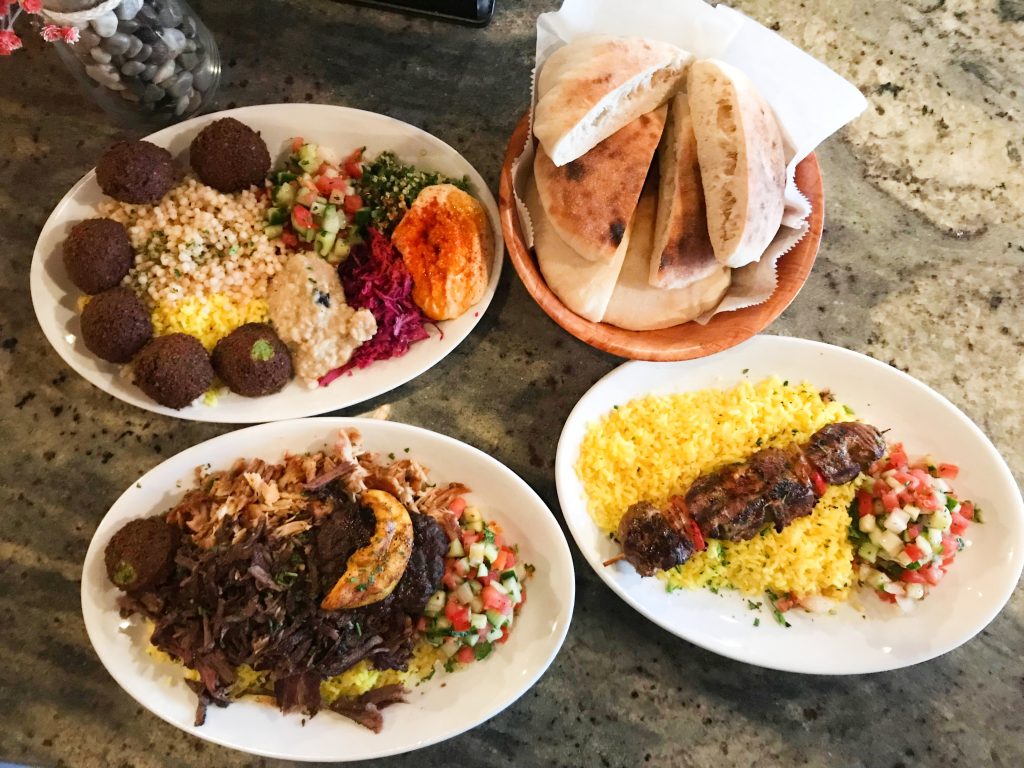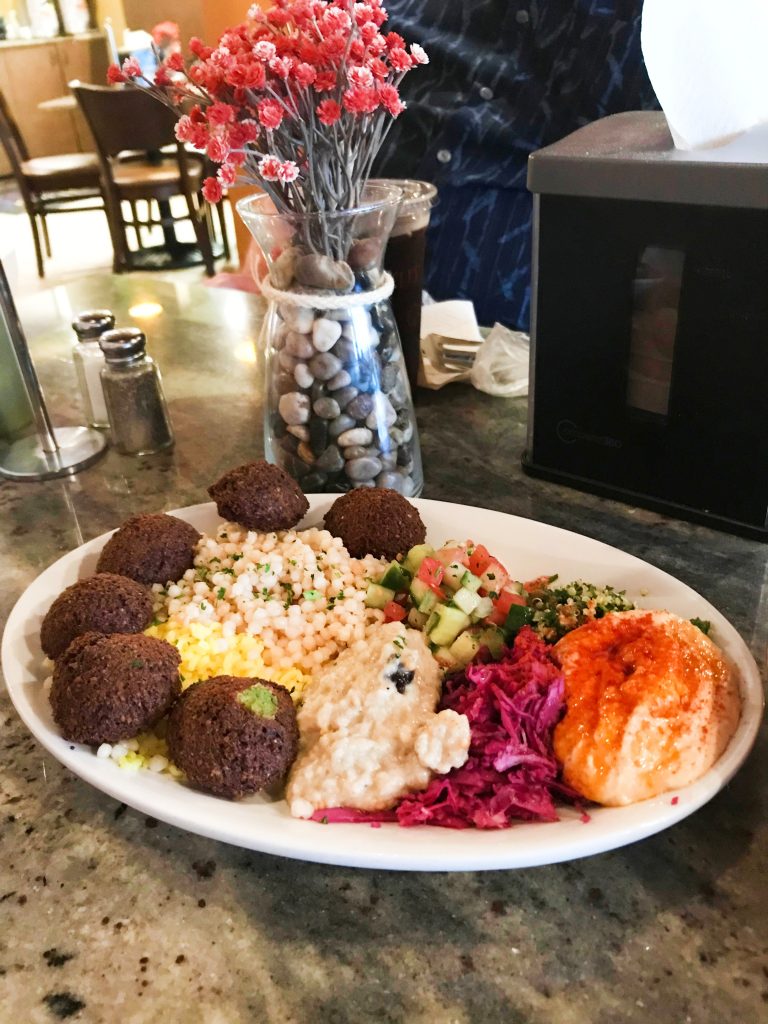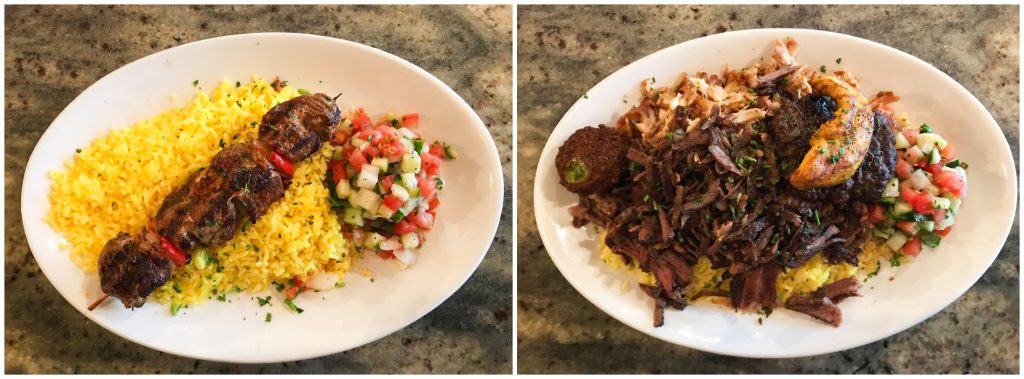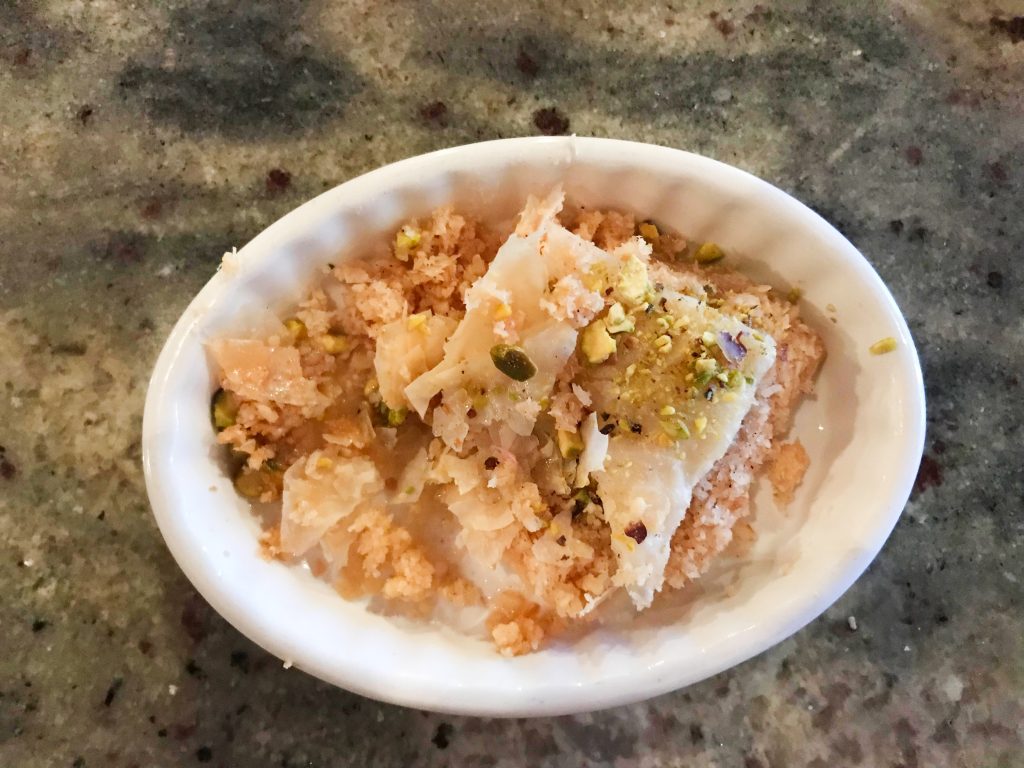The Restaurant of Milk and Honey
By Katie_Bohannon • December 13, 2018

Eli’s Jerusalem Grill
4673 US-280, Birmingham, AL 35242
An unforgettable restaurant experience is more than delicious food on a plate. Quite often, food is a bridge between two worlds, a doorway that opens relationships, or a manner of connecting with others over familiar territory. Thanks to an exceptional server named Marva, such was my experience at Eli’s Jerusalem Grill, an Israeli restaurant, in Birmingham, Alabama.
My parents and I arrived at Eli’s Jerusalem Grill shortly after 4pm on a grey Thursday afternoon, the restaurant’s red and blue “Open” sign blinking brightly. Unfamiliar music flooded our ears as we hurried inside, damp and shivering from the rain. Soft lighting fell upon mustard walls creating a warm coziness, and to our left, large crimson arches arose like towers outlined in forest green. I scanned the smallish dining area for other customers, but there were none: only a collection of square tables scattered throughout the middle of the room, and empty chairs. Apart from the staff, we had the entire restaurant to ourselves.
A warm, welcoming smile greeted us as we approached the counter, which separated the dining area from the kitchen, and we were given all the time to order as we desired. Marva, who stood behind the counter to take our order (and who later served us), happily answered any of my parents’ questions about the contents of certain meals and provided explanations that cleared up any fogginess.
Most of Eli’s menu offered recognizably popular dishes in Israeli cuisine, though I did notice a few Americanized options, like French fries and chicken tenders. Wanting to try as much of the menu as possible, we all ordered a different dish. My mother ordered the combination plate ($15.99), which consists of shawarma, Kefta kabob, falafel, and chicken tenders. Longing to taste the Israeli salads that I researched for months, I went with the vegetarian plate ($10.25), which features falafel, hummus, Baba Ghanoush, Tabouli salad, and red cabbage salad. My father, unwilling to resist one of his favorite American sides, ordered sweet potato fries to keep his lamb kabob ($12.97) company.
All the main dishes at Eli’s are spread delicately over a bed of basmati rice or Israeli couscous; I asked for half-and-half, which is an option the restaurant provides for diners, so that I could try both. Accompanying each dish is a bowl of warm, soft pita bread that pulls apart like cotton candy in your hands.
Drawn to those massive arches I noticed earlier, my mother and I scooted onto a leather bench as my father seated himself comfortably in a wooden chair. Atop each table sat a box of napkins, salt and pepper shakers, and a vase filled with earthy colored pebbles holding sprouts of tiny, artificial, reddish-pink flowers that popped against the neural tones, flourishing like miniature carnations. Behind mine and my mother’s back was a photograph of the Wailing Wall in Jerusalem, expanding the entire length of the restaurant’s actual wall as if it were a mural. Turning around for a better look, we let our eyes drift from person to person amongst the clusters of tourists intermingling with Israeli citizens and noticed that limestone squares (similar to that of the Wall itself) connected the bottom of the mural to the top of our leathered seating.
Having the entire restaurant to ourselves allowed us to take in our surroundings without restriction, and new points of conversation spilled from our mouths, like the enormous closeups of ingredients plastered upon the opposing wall. The framed photographs collecting underneath the world “Family,” filled my heart with warmth and a quiet happiness, knowing that I was sitting down to eat a cuisine so rooted in family with my own. Since Eli’s Jerusalem Grill is a family business, the personalized touches of Eli’s own family photographs decorating the walls added to the feeling of home that drifts throughout the establishment.
Stomachs growling, we were delighted when Marva placed sizzling, steaming dishes in front of us, appetizing and smoky aromas engulfing our noses as we inhaled the excitement of newness. My father dug in straightaway, grabbing a handful of sweet potato fries, and immediately offering the bowl to the rest of us as a sign of his approval. The fries were soft and moist and warm, sprinkled lightly with salt that perfectly matched their sweet flavor. On my own plate, I tasted the falafel first and was not disappointed—though the outer shell was crispy, and I bit into the fried ball with a crunch, the bright green stuffing was soft and almost melted in my mouth.
As I explored the rest of my food, foreign flavors and textures morphed together to create a pleasing medley of deliciousness: from the clean, lemony flavor of the Israeli salad’s diced cucumbers and tomatoes, to the creamy, orange hummus, to the bold, striking violet cabbage, each new bite exploded with an unusual, fresh, and pleasing taste.

People came and went as we ate, briefly escaping the rain before braving the weather again with their takeout orders, as Marva (the only server) tended generously to both my family and the other customers. She balanced taking orders, serving, and maintaining the restaurant’s cleanliness, all while checking on us regularly and appeasing all my mother’s curiosities. But it was the magic of Kefta and Tabouli salad that transformed Marva into someone other than our wonderful server.
After scrunching up her face and shaking her head to eradicate the sourness from her taste buds, my mother politely sat down her silverware and whispered, “What is in that?” Granted, the Tabouli salad did have a bright, pungent taste that we were all unaccustomed to, and the Kefta patty on my mother’s combination plate was chewier and tasted more mysterious than the rest of the brilliantly seasoned chicken, beef, and lamb that rested upon a palette of yellow rice. At the sight of my mother’s hand, Marva immediately visited our table and explained the ingredients of both interesting dishes, stating that the sharpness of the Tabouli was from the parsley, cilantro, olive oil, and lemon juice, while the tenderness of the Kefta kabob came from its blend of beef and lamb. “Everything here is all organic,” she assured us, but the food’s freshness spoke for itself.

Our conversation drifted from the food to the restaurant. “You came at the perfect time,” Marva told us. “During lunch, there are so many people and not enough seats, and everyone is rushing around. Dinner is sometimes the same.”
I told Marva I was excited to try such diverse dishes, and that I was studying Israeli cuisine for one of my courses in college. Her face lit up automatically, and she asked if I had to cook in front of the class. When I told her that we could bring dishes for our peers to try, she laughed and said, “You could just order takeout from here. They would say, wow, this tastes amazing!”
As we learned more about Israeli cuisine through trying the new foods before us, we learned more about Marva, as well. She told us she was from Israel and had lived in Alabama for about two years now. When she first traveled to America, she lived in Louisiana, but soon transferred to the University of Alabama because she disliked Louisiana so much.
“Israel, like America, is a mixing pot. The cuisine is such a blend of so many cultures,” Marva explained, and it was surreal to hear the same quote I’d found time and time again during my research leaving the mouth of someone who had a personal relationship with the food. She told us stories of Israel’s ancestors dwelling in tents and learning recipes from one another, and after I mentioned attempting Shakshuka at home, she reminded me that although it is revered in Israel, the poached egg dish originated in North Africa.
Suddenly, Eli’s Jerusalem Grill transformed from just another restaurant into a passageway leading us into the unknown, revealing the personal relationship that this place and this food establishes with its customers. Stumbling inside with childlike grins, three young men yelled, “Marva!” She turned from us to wave and revealed that the trio were brothers who previously worked at Eli’s. Even though they are no longer employees, the brothers frequently come back to visit, laugh, and of course, eat. As the sun began to sink into the cloudy sky, more people walked through Eli’s door: a father and son sunk their teeth into shawarma, a lone diner sipped freshly brewed sweet tea, a cluster of double daters huddled in the nook by the window, conversing cheerfully.
At Eli’s, the familial atmosphere transcends portraits of weddings and reunions framed on walls—hospitality is in the air, and in the comfort of delicious food that brings people together. Customers relax in their seats as they scoop Baba Ghanoush with pita, eating their fill as if they were visiting a relative’s home. Towards the end of our meal, Marva appeared, setting a bowl of baklava in our table’s center. “Here,” she said, “This is on me.”

My father ate half the dish in the amount of time I took to grab my phone for a quick photo, a testament to the sticky, sweet pastry’s pure goodness, and the delight that comes from swallowing each flaky, honey-drizzled bite. He informed Marva we would, undoubtedly, return for another meal.
For the three of our meals combined, we paid around $48.00, but the memories that Eli’s gave us to accompany its wonderful cuisine are priceless. Targeting such a variety of diners, Eli’s Jerusalem Grill’s food adapts to each customer’s schedule, and whether a diner is in a rush on their lunchbreak, or they have all the time in the world, the fondness and enjoyment that comes with each meal is unwavering. With the brilliantly seasoned cuisine as a bridge, my family and I crossed into another world, and were privileged enough to learn new perspectives through Marva’s eyes that personalized our own experience. It was evident that for most of the individuals who filtered into the restaurant for dinner, that evening was not their first visit to Eli’s, and I can suspect it will not be their last. I am certain it will not be mine.